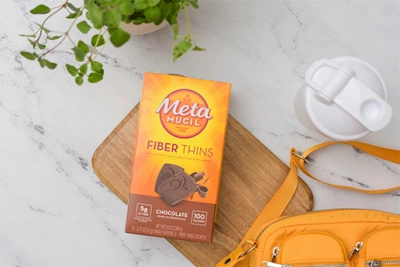Psyllium Fiber
How Psyllium Maintain Healthy Blood Sugar Levels | Metamucil
Learn how psyllium fiber in Metamucil supports healthy blood sugar levels and overall digestive wellness.
Read Article
Metamucil Benefits
How to Stop Feeling Hungry Between Meals
It’s not easy to resist the urge to snack in between meals. Try these 10 tips to control your hunger like drinking Metam
Read Article
Constipation
10 FAQs about Occasional Constipation
Get answers to common constipation questions, including causes, symptoms, and fiber-based solutions for relief.
Read Article
Fiber Supplements
The Benefits of Fiber Supplements
Learn how Metamucil fiber supplements improve gut health, promote regularity, and support overall digestive wellness.
Read Article
Constipation
Causes & Remedies for Constipation in Pregnancy │ Metamucil
Learn why constipation occurs during pregnancy and discover safe, effective tips for comfort and digestive health.
Read Article
Fiber Supplements
How to Take Psyllium Husk Supplements like Metamucil
Learn the best way to take psyllium husk supplements like Metamucil for optimal digestion and regularity.
Read Article
Fiber 101
How to Get More Fiber in Your Everyday Diet
Check if you’re getting 28g of fiber daily and explore 15 simple ways, including Metamucil, to boost fiber intake.
Read Article
Fiber 101
4 Energy Boosting Foods You Should Be Eating
Add fiber-rich foods to your diet for lasting energy and better digestion with simple, practical tips for a healthier li
Read Article
Constipation
How to Relieve Constipation During Pregnancy
Of the potential side effects of pregnancy, constipation can be one of the most irritating. Read how to avoid constipati
Read Article
Fiber Supplements
How to Get Fiber on Keto
Discover how to supplement fiber on a low-carb keto diet for better digestion and improved overall health.
Read Article
Metamucil Benefits
Metamucil’s Two-Week Challenge, How to Join & its Benefits
Discover the benefits of Metamucil’s Two-Week Challenge and learn how adding fiber to your diet can support better diges
Read Article
Psyllium Fiber
How the psyllium fiber in Metamucil can help lower cholesterol
Metamucil, a psyllium fiber supplement, helps promote digestive health to maintain regularity. It also helps lower chole
Read Article
Fiber 101
High-Fiber Foods to Up Your Daily Fiber Intake
Discover top high-fiber foods to improve digestion and regularity with easy tips to boost daily fiber intake.
Read Article
Psyllium Fiber
What is Psyllium? The Ultimate Guide to Psyllium Husk
Learn what psyllium husk is and how it supports digestion, heart health, and regularity for better wellness.
Read Article
Metamucil Benefits
How Metamucil Works in Your Body
Learn how Metamucil psyllium fiber traps sugars and carbs to support gut health and maintain regularity.
Read Article
Constipation
9 Easy Remedies for Occasional Constipation Relief
Learn effective constipation relief tips with fiber supplements and lifestyle changes for improved regularity.
Read Article
Constipation
How often should you poop?
Experts say pooping regularly can mean anything from three times a day to three times a week. Find out what affects how
Read Article
Psyllium Fiber
Psyllium: The Super Fiber in Metamucil
Psyllium husk, a natural fiber originating from plantago ovata, has been the source of both soluble and insoluble fiber
Read Article
Constipation
Occasional Constipation 101: Causes, Symptoms and Treatments
Understand occasional constipation—its causes, symptoms, and treatments. Learn how fiber can help restore balance.
Read Article
Constipation
How Can Fiber Supplements Help Occasional Constipation?
Discover how Metamucil fiber supplements ease constipation and naturally support healthy digestion and gut health.
Read Article
Fiber 101
Which Dietary Fiber Supplement Is Best for Me and My Diet?
Discover why fiber is essential for gut health, daily fiber needs, top sources, and how Metamucil supports regularity.
Read Article
Fiber 101
How Much Fiber Per Day Should You Eat?
Find out your daily fiber requirements and how to increase intake with fiber-rich foods and Metamucil supplements.
Read Article
Metamucil Benefits
Benefits of Metamucil Fiber Supplement
Explore the benefits of Metamucil, the #1 psyllium fiber supplement, including dosage tips for digestive and heart healt
Read Article
Fiber 101
What is Soluble Fiber and Where Can I Find It?
Discover the benefits of soluble fiber for heart and gut health and learn easy ways to add fiber-rich foods to your diet
Read Article
